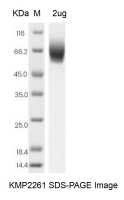Human CD33L3 Protein, Fc Tag, Avi Tag
-
产品编号
KMP2261
-
别名
唾液酸结合免疫球蛋白样凝集素-15, Sialic acid-binding Ig-like lectin 15, Siglec-15
-
规格
- 50ug
- 100ug
- 200ug
| Alias | 唾液酸结合免疫球蛋白样凝集素-15, Sialic acid-binding Ig-like lectin 15, Siglec-15 |
| Catalog Number | KMP2261 |
| Product Description | The Human CD33L3 Protein(KMP2261) is produced in HEK293 Cells and the target gene encoding Phe20-Thr263 is expressed with a Fc, Avi tag at the C-terminus. |
| Molecular Name | CD33L3 |
| Species | Human |
| Host | HEK293 Cells |
| Size | 50ug, 100ug, 200ug |
| Purity | >90% as determined by SDS-PAGE |
| Purification | Affinity purification |
| Endotoxin | <1.0 EU/ug determined by the LAL method |
| Formulation | PBS, 150mM Nacl, 0.3% Chaps, 5% Trehalose, pH7.4 |
| Background | Human Siglec-15 is a transmembrane glycoprotein in the Siglec family. Siglecs are type I transmembrane proteins where the NH3+-terminus is in the extracellular space and the COO--terminus is cytosolic. Each Siglec contains an N-terminal V-type immunoglobulin domain(Ig domain) which acts as the binding receptor for sialic acid. These lectins are placed into the group of I-type lectins because the lectin domain is an immunoglobulin fold. All Siglecs are extended from the cell surface by C2-type Ig domains which have no binding activity. Siglecs differ in the number of these C2-type domains. Human Siglec-15 consists of a 244 amino acid(aa) extracellular domain(ECD) with two Ig-like domains, a 21 aa transmembrane segment, and a 44 aa cytoplasmic domain. Siglec-15 function is important for osteoclast formation and TRANCE/RANK Ligand signaling in osteoclasts |
| SDS-PAGE |  |
| Predicted Molecular Weight | 26.56 kDa |
| Storage Condition | Aliquot and store at -20℃ to -80℃. Avoid repeated freezing and thawing cycles. |
| Shipping Condition | In general, the proteins are provided as lyophilized powder which are shipped at ambient temperature. They are shipped out in dry ice if supplied in liquid form. |
| Uniprot ID | Q6ZMC9 |
| References | Glycobiology 17:838-846 (2007) |
| Function | Binds sialylated glycoproteins. |





 0
0
